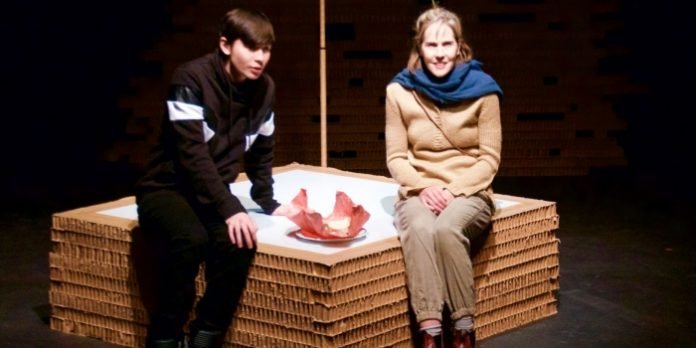There are two very powerful scenes in Satellite(s). They both come from the human impact of Vancouver’s housing crisis, which is at the centre of Aaron Bushkowsky’s new play.
Unfortunately, these two moments are fleeting inside this topical play, ultimately adding little to the conversation, and frustratingly getting lost inside a ridiculous sex farce.
Taking its name from the term “satellite kids”, it is a phenomena first coined by Chinese-language media to represent the children who reside in Canada, usually to complete their education, after the adult members of the family have returned to their country of origin.
In Bushkowsky’s play, the satellite kid is 18-year old Li.
In the best performance of the night, Mason Temple plays Li with a wonderful vulnerability beneath a false exterior, as he struggles to adapt to his new life in Vancouver. Abandoned after his mother returns to China, Li occupies a five million dollar mansion among a tony, and predominately white, Vancouver neighbourhood. Torn from family and friends in China, Li finds himself lost, forced to deal with his new isolation on his own.
Oddly befriending his next door neighbour, Jan, she is a local activist, looking to protect Vancouver’s vanishing heritage homes, irate over the demolition of older houses, usually to be replaced by modern mega-mansions by foreign buyers. Jan is equally as angry with the parents of satellite kids like Li, believing they have simply abandoned their children in a foreign country.
Inexplicably traveling to China, Jan confronts Li’s mother, Cherry. Jan soon discovers not everything she believes about satellite kids is true. Instead, Cherry opens Jan’s eyes to why at least some kids are shipped off to live in other parts of the world in this manner.
It is in Li’s isolation and Cherry’s demonstration where Bushkowsky finds real resonance.
In an exploration of otherness and our preconceived, and often false, views of immigrants and our housing crisis, Bushkowsky helps us look beyond our own neighbourhoods. While Vancouver may be quickly becoming unaffordable for the average resident, through Li and Cherry, Bushkowsky confronts some of our media-fueled views around foreign investment. In challenging our beliefs, and viewing the issue from the other side, albeit through the lens of a white middle-aged male, Satellite(s) is effective.
Unfortunately though, those moments which add even a kernel of something new to the dialogue are all too fleeting. Instead, Bushkowsky continues to feed the often myopic view from ground zero, where statistics are used to reinforce often unsubstantiated beliefs in what is a very complicated issue.
In perhaps realizing a serious investigation into this complex issue can only provide so much drama before it gets boring (and it does), Bushkowsky pads out his two hour play with what can only be described as a sex farce.
In this secondary story, Jan’s husband Andy has an affair with Cherry’s realtor, Sandy. Meanwhile, Cherry ends up falling for government official, Omar, who holds the key to her son’s life in Vancouver. The two pairings are not only contrived but, to make matters worse, it is impossible to believe either women would have anything to do with these two self-centred men.
Working hard with what they have been given, there is little for the four adult actors to latch onto. While Meaghan Chenosky manages to mine some of the humour as the realtor, the two men, played by Anousha Alamain and Alex Zahara, come across as cartoonish. Jillian Fargey as Jan, and Sharon Crandall as Cherry fare a little better, but only intermittently.
Beyond Mason Temple’s performance, the other captivating piece to Satellite(s) comes from set designer, Yvan Morissette. Using stacks of corrugated cardboard, Morisette provides both a beautiful sculptural backdrop, and a few functional pieces.
Director Bill Dow bookends Bushkowsky’s play in very visual scenes, where his characters speak of home and loneliness. Lit solely by the light of the ubiquitous smart phones, the two scenes speak volumes to our deepening urban isolation. If only the rest of Satellite(s) was as effective.
Satellite(s) by Aaron Bushkowsky. Directed by Bill Dow. A Solo Collective Theatre production. On stage at Performance Works (1218 Cartwright St, Granville Island, Vancouver) until November 26. Visit https://solocollective.ca for tickets and information.

